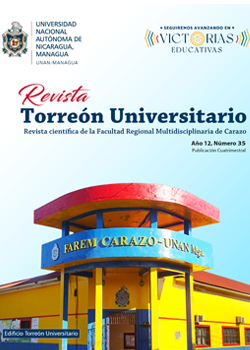Good practices in entrepreneurship from universities. systematization of entrepreneurship in the Multidisciplinary Regional Faculty of Carazo, UNAN - Managua
DOI:
https://doi.org/10.5377/rtu.v12i35.16983Keywords:
Entrepreneurship, Innovation, Entrepreneurial cultureAbstract
This document contains a description of the 23-year history of the Multidisciplinary Regional Faculty of Carazo, training young people with a creative, innovative vision, through an entrepreneurial culture. The description is from personal experience as a student participating in the Entrepreneurship Fair I during 1998, as an entrepreneur during 1999 and as a teacher since 2020.
Since its inception , an entrepreneurial culture has been promoted in students of this faculty, thanks to the correct vision of directors and teachers, first of all in the economic sciences department and currently in all careers and programs such as Universidad en el Campo. There have been university fairs for entrepreneurs, multidisciplinary research to strengthen the business plans established enterprises, business plan designs with a focus on innovation and entrepreneurship so that students consider them as an alternative for generating income.
Through the extension, the faculty has transcended in train strategic social groups on entrepreneurship, it has participated in international and national competitions, obtaining much recognition, responding to the needs of the contexts at different times. Achieving significant influence on the sustainable political, economic and social development of the country.
Downloads
References
Barrios-Hernández, K., & Oliviero-Vega, E. (2020). Relación Universidad-Empresa-Estado. Un análisis desde las instituciones de educación superior de Barranquilla-Colombia para el desarrollo de su capacidad de innovación. Formación Universitaria, 13(2), 21-28.
Barnechea, M y Morgan, M. (2007). El conocimiento desde la práctica y una propuesta de método de sistematización de experiencias, Lima.
Duarte, Tito, y Ruiz (2009). Emprendimiento, Una Opción para el Desarrollo. Scientia EtTechnica, XV(43),326-331. ISSN: 0122-1701. Disponible en: https://www.redalyc.org/articulo.oa?id=84917310058
Fayolle, Gailly, and Lassas‐Clerc. (2006), "Assessing the impact of entrepreneurship education programmes: a new methodology", Journal of European Industrial Training, Vol. 30 No. 9, pp. 701-720. https://doi.org/10.1108/03090590610715022.
Liñan, F. (2004). Intention based models of entrepreneurship education. Piccolla
Impresa/Small Business, 3, 11-35.
Moreno, N. (2019). Emprendimiento; Educación Superior; Docentes del Siglo XXI. Licenciatura en Educación Física y Deporte. Escuela y Sociedad. Corporación Universitaria CENDA. Bogotá Colombia.
Ruiz del Castillo, A. (2003) “Educación superior y globalización. México: Plaza y
Valdes.
Sánchez, M., y Cáceres, J. (2015). La idea de universidad del cardenal John Henry
Newman.Cauriensia, Vol. X, 2015 – 335-358, Universidad de Extremadura.
Torres, A. (1996), “La sistematización como investigación interpretativa crítica: entre la teoría y la práctica”, Mimeo, Santiago de Chile.
UNAN-Managua. (2011). Modelo educativo, normativa y metodología para la planificación curricular. Managua: Editorial Universitaria.
Published
How to Cite
Issue
Section
License
Copyright (c) 2023 National Autonomous University of Nicaragua

This work is licensed under a Creative Commons Attribution-NonCommercial-NoDerivatives 4.0 International License.
Los autores que publican en esta revista están de acuerdo con los siguientes términos.
- El autor o los autores de los artículos, ensayos o investigaciones conceden a la Universidad Nacional Autónoma de Nicaragua, Managua (UNAN-Managua) los derechos de edición (copyright) del trabajo enviado, por consiguiente la Universidad cuenta con el derecho exclusivo para publicar el artículo durante el periodo completo de los derechos de autor.
- Estos derechos de autor/ autores autorizan a la Revista Torreón Universitario y a la Universidad editar y divulgar/publicar el artículo en dicha Revista, incluyendo reproducción impresa y electrónica, el almacenamiento, recuperación y cualquier otro tipo de publicación, y fuentes de información secundaria como servicios de resúmenes y bases de datos, así mismo la facultan a proteger el artículo contra el uso no autorizado para su difusión por medios impresos o electrónicos (PDF, HTML, EPUB, XML u otros).
Licencia para el uso del contenido
La revista hace uso de la Licencia Creative Commons Atribución-NoComercial-SinDerivar 4.0 Internacional.
Bajo esta declaración:

Este revista está sujeta a una licencia de Creative Commons Reconocimiento-NoComercial-SinObraDerivada 4.0 Internacional. Puede ser copiada, distribuida y transmitida públicamente siempre y cuando se cite al autor y la fuente (Revista Torreón Universitario), no debe modificarse ni utilizarse con ningún fin comercial. La licencia completa se puede consultar en http://creativecommons.org/licenses/by-nc-nd/4.0/.

